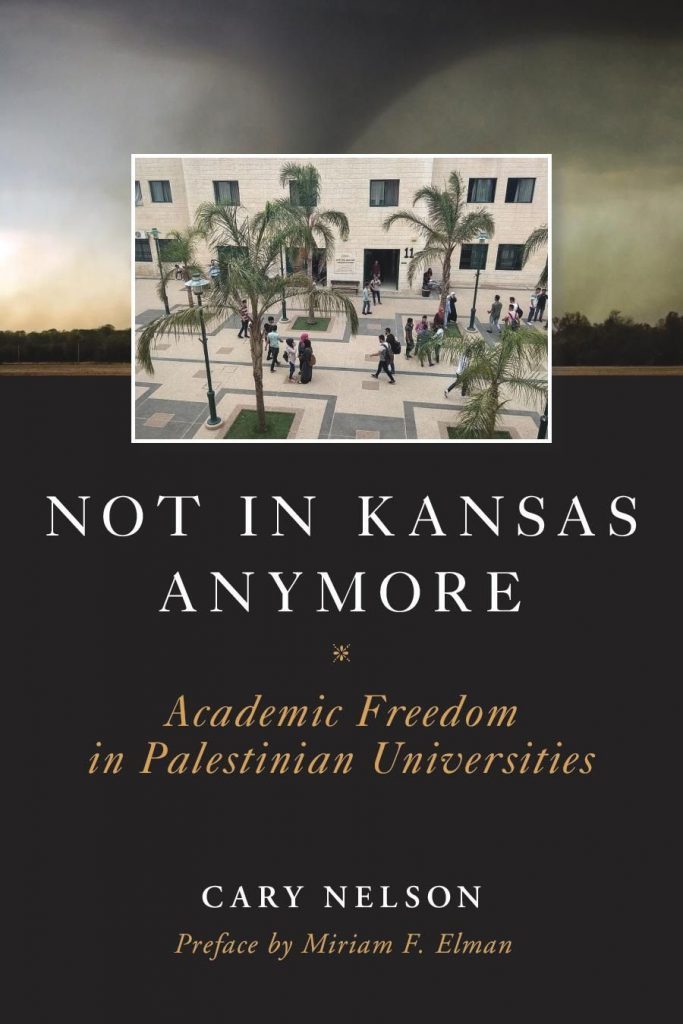Not in Kansas Anymore
Not in Kansas Anymore: Academic Freedom in Palestinian Universities
"Not in Kansas Anymore: Academic Freedom in Palestinian Universities," by AEN member Cary Nelson, Professor Emeritus at the University of Illinois, Urbana-Champaign, is the first paper in AEN's Research Paper Series.
NIKA, which includes a preface by Miriam Elman, is a meticulously researched account of the multiple ways in which academic freedom is suppressed on Palestinian campuses. While many BDS advocates point to alleged Israeli restrictions on Palestinian students and faculty, there has been little discussion of how violent factionalism, religious extremism, and incitement have been the true impediments to free speech and academic freedom at Palestinian institutions of higher education.
Featuring numerous historical and contemporary studies of Palestinian higher education; original interviews with faculty, administrators, and students; and extensive media coverage of events and incidents in Palestinian universities over the past two decades, Nelson aims to correct the widespread ignorance about the nature of academic freedom on Palestinian campuses.
Copies of NIKA are available for purchase on Amazon. Orders may also be placed with Academic Studies Press, which is distributing the paper.
Excerpts of NIKA – the preface and a profile of Palestinian academic Mohammed Dajani – are available to read now.
Reviews of NIKA:
“Cary Nelson is a mighty thinker and a scrupulous scholar. Read him: you will benefit.” —PAUL BERMAN, author of The Flight of the Intellectuals
“Not in Kansas Anymore is an eye-opener, a must-read for anyone who cares about “the Israeli problem” today. As the outside world would have it, Palestinian universities function more or less like those in the US or Western Europe. Whatever disruption and violence do occur on their campuses—and there have been many recent incidents—the blame is regularly placed on Israeli interference. Cary Nelson’s meticulously researched and documented study demonstrates incontrovertibly that the truth is quite otherwise, that at Birzeit and other universities, the major threats come from within, controlled politically as these universities are by the Palestinian Authority’s Fatah and paramilitary and terrorist groups, especially Hamas. Nelson’s narrative, copiously illustrated with color plates, provides astonishing evidence of student involvement in suicide bombings and terrorist cells. It is the universities themselves that provide the fuel for terrorist activity against Israel.” —MARJORIE PERLOFF, Sadie D. Patek Professor Emerita of Humanities, Stanford University
“This richly researched volume details the role that Palestinian activists play in the sorry state of academic freedom on the West Bank and in Gaza. BDS supporters who deny Palestinians any agency in their plight can no longer plead ignorance in this matter for which they share responsibility due to their repeatedly professed solidarity. As in his other writings, Nelson brings much needed clarity to a debate often mired in polemic. Nelson’s study, however, is also a cautionary tale that alerts us to the political conformity that some academic radicals have in mind for American universities too.” —RUSSELL A. BERMAN, Walter A. Haas Professor in the Humanities, Stanford University; Co-Director, Working Group on Islamism and the International Order, Hoover Institution
“This is an exceptionally valuable and illuminating examination of academic freedom in Palestinian universities and the forces that threaten it. Cary Nelson’s carefully documented, thoughtful, and systematic analysis demonstrates how those threats stem (in genuinely “intersectional” fashion) both from the Israeli occupation and, even more strongly and directly, from dynamics in Palestinian society and politics—involving not only external pressures on universities but also political factionalism, violence, and intimidation within the universities themselves. Nelson’s exploration of this highly charged subject and its larger implications brings together three of his long-term commitments: active and principled defense of academic freedom and open intellectual exchange; strong support for achieving a peaceful two-state solution to the Israeli-Palestinian conflict that can do justice to the legitimate aspirations of both peoples; and his penetrating critical analyses of the ways that one-sided anti-Zionist ideological discourse distorts the realities of the conflict, is used to promote and justify academic blacklisting, and thus endangers academic freedom internationally as well as harming both Israelis and Palestinians. This study can usefully contribute to informing debates on all those issues, and it should be welcomed—and seriously engaged—by fair-minded people on all sides of those controversies who are willing to honestly confront difficult and complex realities.” —JEFF WEINTRAUB, Bryn Mawr College
“Not in Kansas Anymore persuasively challenges a now central complaint, namely that Israel is responsible for violating the academic freedom of Palestinians and for the ‘silencing of Palestinian contributions to knowledge.’”
—MIRIAM F. ELMAN, Syracuse University, AEN Executive Director
